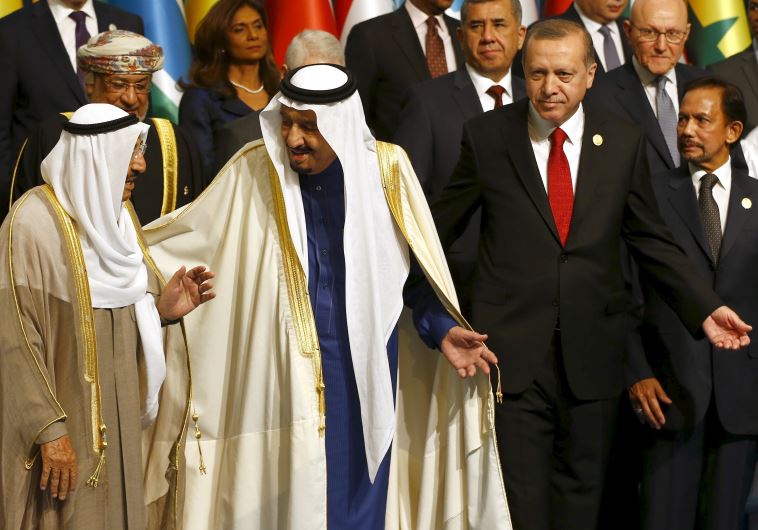Turkey seeks foreign investment from Saudi Arabia
Turkish President Recep Tayyip Erdogan is on a three-day tour of Gulf states to try to attract foreign investment for his country’s struggling economy, including from former rivals of Ankara.
Erdogan has visited Saudi Arabia’s Mohammed bin Salman and the United Arab Emirates, two countries that have seen a push from Turkey for a strengthening of ties. He has also visited Qatar, one of Turkey’s strongest allies. Turkey’s state news agency reported that Erdogan said he wanted the trip to lead to investment deals.
Cem Cakmaklı, an assistant professor of economics at Koc University in Istanbul, told The Media Line that Gulf states would be especially interested in investing in Turkey’s large tourism sector, as well as the health and banking sectors.
“Turkey is in desperate need of foreign deposits,” Cakmaklı said. “We have a huge current account balance; we have huge foreign debt.”
Cakmakl added that Turkey’s devalued lira makes purchases in the country cheap for foreign investors and that the country could be an attractive market because of the number of consumers in Turkey with a population of about 80 million people.
 Turkish President Tayyip Erdogan (R), Emir of Kuwait Sheikh Sabah al-Ahmad al-Sabah (L) and King Salman of Saudi Arabia at the Organisation of Islamic Cooperation (OIC) Istanbul Summit (credit: REUTERS)
Turkish President Tayyip Erdogan (R), Emir of Kuwait Sheikh Sabah al-Ahmad al-Sabah (L) and King Salman of Saudi Arabia at the Organisation of Islamic Cooperation (OIC) Istanbul Summit (credit: REUTERS)He said that Western countries would unlikely be able to be a strong source of investment currently because they are keeping funds within their own countries amid a rise in interest rates.
At the same time, Erdogan is shifting his political focus eastward.
“Turkey wants to use its cultural ties [and] its personal ties as well with these countries to attract foreign direct investment,” Cakmaklı said. “Turkey is leaning more to the east rather than west … so Gulf countries were kind of a natural destination for foreign direct investment.”
Saudis to acquire Turkish drones
During the trip, a deal for Saudi Arabia to purchase drones made by a Turkish company was announced. The Bayraktar drones have gained international fame after Ukraine’s use of them to thwart Russian attacks in the country.
While the company is privately owned, one of the owners is Erdogan’s son-in-law, and analysts say weapons sales are tightly regulated by governments.
Timothy Ash, an economist focused on Turkey and a strategist at BlueBay Asset Management, told The Media Line that the deal with Saudi Arabia was very significant considering the company’s close ties to Erdogan. He said it reflected the countries’ interests in developing a domestic military industry and a way to diversify away from the US.
“The region wants to be increasingly independent in terms of its defense area and Turkey offers that,” Ash said.
Ankara and Riyadh used to be foes, reaching a low point in their relationship after the 2018 killing of Saudi journalist Jamal Khashoggi at the Saudi Consulate in Istanbul. In the aftermath, pro-government outlets in Turkey continuously reported leaks about alleged information involving Khashoggi’s death and a purported audio recording of it, putting major international pressure on Riyadh and bin Salman.
Erdogan gave Turkey’s first domestically produced electric car, the Togg, to both Qatar’s Emir Sheikh Tamim bin Hamad al Thani and Saudi Arabia’s Bin Salman.
The trip comes amid major concerns for Turkey’s economy, with inflation reported in June at 38%. However, independent economists have argued that the real rate is far higher than what the government has reported, and last year believed inflation surpassed 180%.
The currency took another hit following Erdogan’s win for re-election and his party’s victory to hold onto a majority in the parliament. It was a surprise win for many after several polls showed the opposition had a strong chance to win, buoyed by the hit to Erdogan’s popularity due to voters’ concerns over the economy.
The Turkish president’s unorthodox approach to financial policies, which had included keeping interest rates low despite surging inflation, has been blamed for the country’s currency crisis and lack of foreign investment.
Many investors have also been scared off by Erdogan’s control over the economy, such as by appointing one of his sons-in-law as the finance minister.
While there was speculation that Turkey could seek a loan from the International Monetary Fund, Cakmaklı believed that was unlikely because of the need for transparency if a country gets a loan from the transnational financial organization.
“The last three years, because of this risk and because of the economic policy that was kind of counterintuitive, foreign direct investment in many senses [it] just retracted,” Cakmaklı told The Media Line.
There have been recent moves by the government that have addressed some of the criticism against the government’s monetary direction, such as an increase in interest rates and adding well-respected economists to the roles of finance minister and the head of the central bank.





Comments are closed.